Freight brokers are an essential source of assistance for shippers that need to transport their goods. Yet, many shippers don’t take full advantage of their help because they don’t realize that these brokers perform a multitude of services. Having a solid understanding of what these brokers do will allow you to better leverage their skills and expertise when you need to ship freight.
The Federal Motor Carrier Safety Administration (FMSCA) licenses freight brokers to help shippers move freight that needs to be hauled. Freight brokers act as the middleman between shippers and carriers, finding the best trucking company for the job and brokering a deal.
In this article, we’ll give you more details about what truckload freight brokers do and the services they can provide you with.
Freight brokers are the middlemen between businesses with goods to ship, and carriers who can transport those goods. In essence, they match cargoes with carriers. You can work with an individual freight broker, or you can outsource this role to a freight broker company. All of these brokers must have a license from the FMSCA.
Freight brokering is designed to help both parties benefit from the entire hauling process. They negotiate with shippers and carriers, helping to secure a price for the transportation service.
By working with a freight broker, you will often receive a much better deal than if you tried to negotiate directly with haulage companies. They aim to agree on a price that ensures shippers can make a profit after moving their goods from place to place.
Similarly, they have the interests of the carrier in their minds as well. The price they agree on will benefit both parties, meaning the carrier can make a profit from the service.
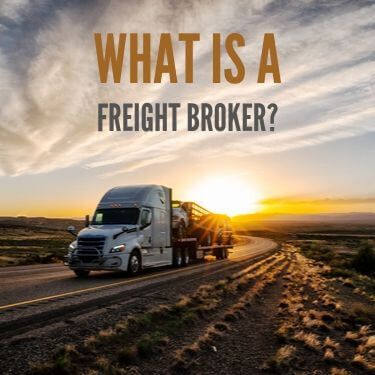
A truckload freight broker’s responsibilities go above and beyond just negotiating a deal between carriers and shippers. Freight brokerage companies are in charge of the following:
When freight brokers are involved, the whole process can move along much faster and more efficiently. Both parties have a way of staying in touch with one another, meaning that any concerns or worries can be broadcast with ease. Brokers are also very beneficial for carriers as they ensure that their trucks always have goods ready to be loaded up and distributed.
This profession exists because not everyone is a freight shipping expert. While many companies need to ship their goods, they don’t always know which carriers are the best or how the overall shipping process works. .
Freight brokers have been working in the logistics industry for years and have undergone extensive training in their field. To qualify for this role, individuals have to go on educational courses and display a vast knowledge of the shipping industry. As such, they are far better equipped to handle this sort of thing.
Without freight brokerage companies, shippers would likely end up spending too much money on below-par services. Not only that, but carriers would see their business falter as well.
To understand how a freight broker gets paid, we need to see what happens when a shipper hires one. In effect, the process looks something like this:
The broker makes these earnings from their client (the shipper) who hires them to find a carrier.
Essentially, freight brokers earn money by securing deals for less than they're paid by their clients. The client is happy as they get the service they need - and for a price, they're comfortable with - and the carrier is satisfied because they get paid, too.
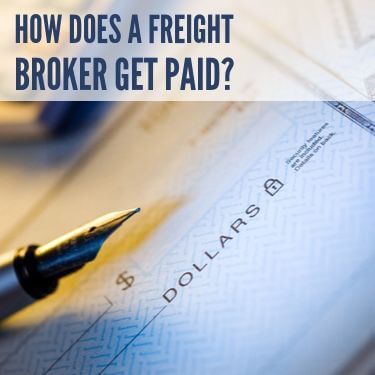
On top of what they’re paid by clients, brokers can also earn bonuses based on how well they perform. This is commonplace in freight brokerage companies; the more deals secured and the more money made for the company, the bigger the bonus.
The crucial part of a freight brokers job is finding carriers for shippers. To do this, freight brokers take advantage of things called broker load boards.
Broker load boards are basically networking sites for carriers and brokers. A freight broker will go onto these load boards and post details of the loads they're currently in charge of. In the meantime, qualified carriers are also on these boards, looking for loads that suit their needs. They register an interest in different loads, and the broker will contact the carriers who are keen.
Both brokers and carriers have to pay subscriptions to access different load boards. It offers brokers an easy way to quickly pair loads up with trucking companies. After all, the more loads a freight broker can move, the more money they can make. It's also advantageous for carriers as it's basically a way for them to always find work.
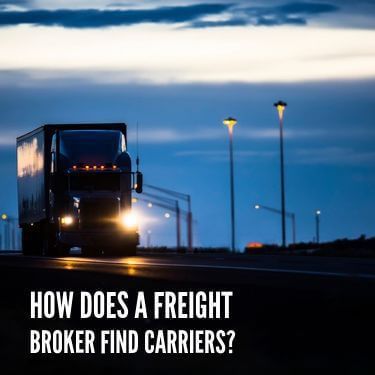
Many brokers use load boards as a way to establish relationships with different trucking companies. From here, they know who will most likely be interested in specific loads, such as ones that will transport freight that requires a flatbed trailer. This makes it even easier to pass them off and get things moving as quickly as can be.
Some freight brokers choose to work from home rather than joining a freight brokerage company. Thanks to the nature of this job, freight brokers are granted this flexibility. l Clients and brokers don't have to meet face-to-face. Everything can be discussed through messages or over the phone, so deals can still be struck, and fees can be agreed.
There's nothing wrong with hiring a freight broker that works from home. However, it's a good idea to exercise caution when considering hiring someone in this position.
Brokers that work from home can’t awlays perform their job to the same accuracy as one who works for a company.

These are generalizations, of course. Not every work-from-home freight broker poses these concerns, it all depends on who you hire.
Freight brokers have to abide by various regulations at all times. In doing so, this ensures that they provide an honest and fair service that benefits all parties involved. The principal regulations revolve around compliance requirements for freight brokers - as set out in the Code of Federal Regulations, Part 371 - Brokers of Property.
These compliance requirements basically spell out the rules that all brokers need to follow.
Brokers must also comply with a new regulation set out by the Federal Drug Administration (FDA). Since April 2018, brokers need to comply with the Sanitary Transportation of Human and Animal Food Rule. This rule outlines different regulations for the transportation of food products. As such, it's only applicable when freight brokers are moving loads with food in them.
Furthermore, freight brokers need a surety bond to obtain their license from the FMCSA. These bonds are required by law, and they're sometimes referred to as trucking security bond or the BMC-84 surety bond. The purpose of this bond is to guarantee that freight brokers follow their contracts with various shippers and carriers.
If any contractual obligations are breached, then carriers or shippers can make claims against the brokerage firm. One of the regulations for broker companies is that they must renew this bond every year.
There are numerous ways that you can reduce transit damage when you ship goods. However, when you are looking for a freight broker, you need to check what insurance they have. While brokers don't physically handle any of the cargo, there are still risks involved in their service.
As a result, these are the different types of insurance that a good freight broker ought to have:
Some types of insurance can be confusing and hard to differentiate. For example, carrier liability and cargo insurance are two that are often mixed up. Our article on carrier libaility vs cargo insurance can help explain these differences.
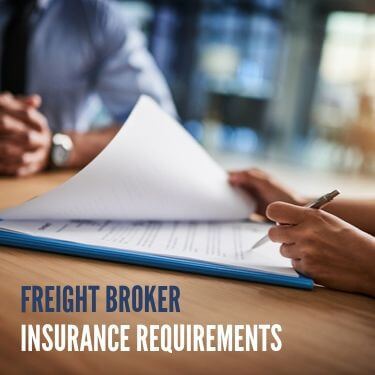
Cargo insurance covers shippers if things happen to their cargo during transportation. Now, freight brokers aren't legally required to have motor truck cargo insurance because they don't actually handle the cargo. However, there are different types of cargo insurance that most brokers do end up getting.
One type of insurance that you should look for is contingent cargo insurance. This coverage acts as a safety net that works alongside the carrier's insurance policy. If a shipper makes a claim for lost or damaged cargo, but the carrier's policy doesn't honor this claim, then contingent cargo insurance steps in. From a shipper's perspective, this is an essential piece of coverage to look for in a broker.
Freight brokers can also be held liable in personal injury cases, wrongful deaths, or negligent hiring. For example, if a carrier gets injured on a job, then they may file a claim against the broker. Vicarious Auto Liability Insurance is here to protect the broker in situations like this.
Ironically, a significant percentage of issues don't even occur during transit. Some brokers make mistakes regarding shipping information or they can accidentally leave information off paperwork. In scenarios like this, they will have Errors & Omissions insurance to offer coverage against any claims.
It's always important to work with freight brokers that have the necessary insurance requirements. If they do, it provides you with added protection in case things go wrong. If there's a problem with your cargo and the carrier won't honor your claim, you can get the compensation you deserve through the freight broker's insurance. The same goes for other relevant claims as well; the insurance makes sure you get what you deserve.
For more information about how to protect your shipments, look into our article on freight insurance.
Freight brokers aren't the only people you may have come into contact with when assessing your transportation needs. Freight forwarders are also involved in the logistics industry, and they offer a service that's somewhat similar to brokers.
Having said that, there are some critical differences between the two professions. Distinguishing between the two is vital as it ensures you pick the right person for your job. We've already discussed freight brokerage, but what exactly is a freight forwarder?
Freight forwarders are also there to act as a go-between for shippers and carriers. They help arrange shipments and find transportation for loads. But, they're also responsible for storing the shipment before it gets sent off.

A shipping company provides them with the load, and the freight forwarders will store it in their own warehouses until they have a trucking company ready to pick it up. All the usual negotiations occur, and freight forwarders handle all the documentation for both parties.
Both jobs involve finding carriers for shippers and ensuring that loads are sent on their way safely. The big difference is that freight forwarders hold onto the cargo before it gets moved.
This has significant implications for their insurance requirements as well. A freight forwarder has to insure all of the cargo they're holding, and they are responsible if anything happens between the shipper giving them the cargo, and it actually being loaded onto a truck.
The freight brokerage industry is considerably large. All the different companies looking to shift cargo across the country are taken into account.
There are businesses of all shapes and sizes that need carriers to transport their goods across long distances. Often, this involves crossing both the Southern and Northern borders. Not only that, but think about the businesses that are shipping items internationally.
Without freight brokers, none of these companies would be able to find carriers to get their cargo loaded up and transported. Well, they could, but it would likely take a lot longer and cost more money. , Freight brokers are an essential aspect of the logistics industry.
To illustrate how large the freight brokerage industry is, the table below has some impressive numbers about its size and future growth.
| Global Market Size Of Freight Forwarding Market In 2021 | $58,530,000.00 |
| Projected Size Of Global Freight Brokerage Market In 2025 | $71,080,000.00 |
Currently, the United States holds the largest share of the freight brokerage market. Its revenue makes up 73% of the global share, with Europe coming in second.
As of 2021, the global market size sits at over $58 million. Recent studies and reports have predicted that there will be a 5% rise in the freight brokerage market over the next five years. In 2025, it's expected we could see a global market size of over $71 million.
Consequently, we can say that the freight brokerage market isn't just big, it's growing. The growth can be put down to various things; the globalization of world business being one of them.
More and more companies are spreading their business worldwide, which puts increased demands on freight brokers. There's also the simple concept of “time is money.” Businesses can't afford to waste time when shipping things, which is why freight brokers have such a prominent role to play.
Freight brokers aren't an essential requirement for businesses that need to ship items. In theory, you could handle everything by yourself and keep it all in-house. But, you would be making life much harder than it needs to be. Most companies choose to hire freight brokers because they bring some significant advantages to the table.
If you're wondering whether or not you should use a brokerage firm, then here are the key benefits of using a freight broker that show their true value.
By working with a freight broker, you will slash the time it takes to get your products from point A to point B. Brokers know how this process works, and they can use special resources - like load boards - to find carriers in half the time it would take you to do the same thing. Also, they handle all of the legal documents and the general admin work that goes into shipping goods.
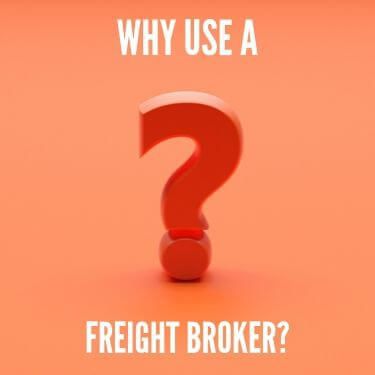
If you tried to do things on your own, then you would likely stretch your resources very thin. You would have to spend time getting all the different documents and shipping materials together while searching for carriers. Bear in mind that you have to do all of this alongside running your business!
As such, you'd probably have to hire people to create your own shipping department. Needless to say, this will cost a lot more than just hiring a freight broker. So, not only will you save time, but you can save a lot of money too.
Another benefit of using a freight broker is that you gain access to someone with a wealth of knowledge and experience. When hiring a freight brokerage company to handle your shipping requirements, you're effectively using a team of people who live and breathe freight shipping. They know all the best practices, and they have enough experience to understand the smartest and most efficient ways of doing things.
Additionally, they will use the latest and best technology to provide you with incredible service. Without a freight broker, you probably won't have access to all the latest shipping technology -- and you won't have the same level of expertise.
Freight brokers are there to help you get the most out of your shipping needs. As a result, their service can be incredibly flexible. Your business is likely to go through periods where you're shipping large loads quite frequently, and periods where things are much slower. A freight broker provides you with the flexibility to accommodate for busy and quiet periods, without you needing to do anything.
A freight brokerage company will have plenty of existing partnerships with trucking companies and other carriers. Thus, they can help you find solutions much faster than if you were looking alone. But, the additional benefit is that they can help you find discounts for your freight shipping. If they've worked with the same carrier before, then there's a chance they can get a reduced price because they have a partnership together. Carriers are willing to lower their rates for freight brokers if they promise consistent work - which will benefit shippers!
Some people worry about working with freight brokers as they think they're just looking to make money at the expense of their business. However, this simply isn't true. Everything a broker does is done in the best interests of your company. They will benefit from your success, and vice versa. In effect, you enter a partnership with a firm that's looking to do everything it can to help your business grow.
To summarize, these are the main reasons you should use freight brokers for your shipping:
All things considered, it makes a lot of sense to go with a broker when freight shipping. It will make your life a lot easier, but it's crucial to choose the best broker you can find. By finding you a good carrier, brokers can ensure you won’t run into any additional charges such as detention fees.
Selecting your freight broker is a significant step. You want to enter a partnership that will benefit your company and improve the entire shipping process for you. Freight brokerage companies aren't all equal, so you have to consider a few things before coming to your decision.
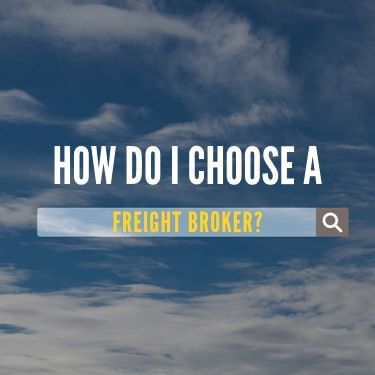
If you are looking to schedule truckload shipping freight, then a freight broker can assist you. At R+L Global Logistics, we can help you with all of your truckload shipping needs. We'll organize your load to be transported to its final destination, and provide you with tracking tools to stay updated at all times.
R+L Global Logistics can move your freight with services including:
With our help, you can lower your shipping costs, run a more efficient business, and spend more time focusing on what makes your company tick. Contact us today by phone at (866) 353-7178.
R+L Global Logistics
315 NE 14th St., Ocala, FL 34470